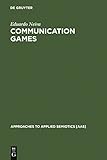Communication Games : The Semiotic Foundation of Culture / Eduardo Neiva.
Material type: TextSeries: Approaches to Applied Semiotics [AAS] ; 5Publisher: Berlin ; Boston : De Gruyter Mouton, [2011]Copyright date: ©2007Description: 1 online resource (306 p.)Content type:
TextSeries: Approaches to Applied Semiotics [AAS] ; 5Publisher: Berlin ; Boston : De Gruyter Mouton, [2011]Copyright date: ©2007Description: 1 online resource (306 p.)Content type: - 9783110190465
- 9783110897753
- 302.2 22
- P94.6 .N45 2007eb
- online - DeGruyter
- Issued also in print.
| Item type | Current library | Call number | URL | Status | Notes | Barcode | |
|---|---|---|---|---|---|---|---|
 eBook
eBook
|
Biblioteca "Angelicum" Pont. Univ. S.Tommaso d'Aquino Nuvola online | online - DeGruyter (Browse shelf(Opens below)) | Online access | Not for loan (Accesso limitato) | Accesso per gli utenti autorizzati / Access for authorized users | (dgr)9783110897753 |
i-vi -- Acknowledgments -- Contents -- Foreword -- Part 1. Canonical games -- Chapter 1. Conflict -- Chapter 2. Coordination -- Chapter 3. Contract -- Part 2. Ancestral games -- Chapter 4. Origin -- Chapter 5. Sex, signals -- Part 3. Individual games -- Chapter 6. Strategies -- Chapter 7. Players -- Afterword -- Notes -- References -- Index
restricted access online access with authorization star
http://purl.org/coar/access_right/c_16ec
Communication Games is a new and radical interpretation of the relationship between culture and communication. It explores the idea that culture and communication studies should be seen predominantly in relation to struggles and conflicts within the social arena. It criticizes the conventional heritage of the social sciences and humanities. Culture and communication are conceived not merely as means of integrating social actors, but as semiotic ways of providing fitness indicators that allow for the resolution of competition between individuals. From the perspective of Peircean semiotics and the Darwinian understanding of life processes, Communication Games redefines culture in terms of Darwin's notion of sexual selection. Moving on from the realization that sexual selection creates individual organisms with conflicting interests, Communication Games emphasizes the contribution of game theory to semiotics and communication studies. The book demonstrates how cooperation and shared conventions eventually emerge, and how conflicts are resolved through the display of costly and inflated signs. It is from these inflated signs and the escalation of excessive messages that cultures gain a certain degree of stability. Communication Games proposes a new way of understanding culture, communication, and semiotic exchange in terms of game theory.
Issued also in print.
Mode of access: Internet via World Wide Web.
In English.
Description based on online resource; title from PDF title page (publisher's Web site, viewed 28. Feb 2023)


